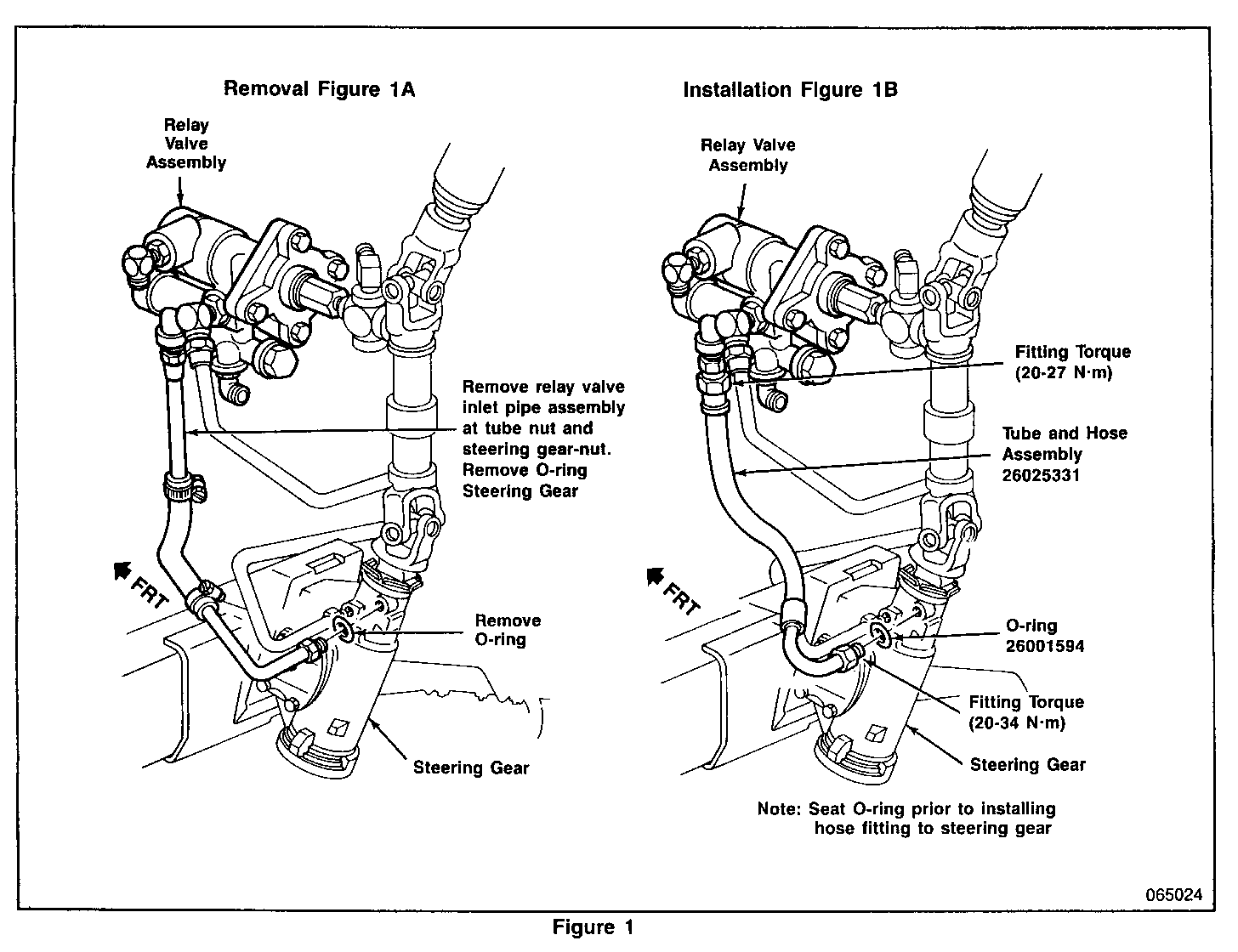AUTO/MANUAL PARKING BRAKE WILL NOT REL. LEAKING STG. FLUID

SUBJECT: AUTO/MANUAL APPLY PARK BRAKE WILL NOT RELEASE/LEAKING POWER STEERING FLUID
MODELS: 1990 P3 MOTOR HOME CHASSIS (16000 LB. GVW ONLY)
Some 1990 16000 LB. GVW P3 motor home chassis may experience fluid leaks near the hose clamps on the hydraulic manual apply park brake hose assembly. This will not allow the park brake to be released. This assembly was manufactured utilizing a hose and clamp assembly (Figure 1A).
To correct the above condition, a new crimped hose assembly (P/N 26025331) has been released (Figure 1 B).
SERVICE PROCEDURE
(Figures 1A and 1B):
1. DO NOT put transmission selector in "Park" position. Use Neutral. DO NOT set manual park apply (leave "park brake" control knob in the OFF position, brake not applied). Ignition in the off position. Put blocks on wheels.
2. Remove the left front wheel well panel. Retain all fasteners and panel for the reinstallation process. Locate the return line hose from Fig- ure 1A. Prepare the removal area by having a towel or rag available to catch any oil leakage from the hose during removal.
3. Obtain the replacement hose (P/N 26025331) prior to removing the old hose assembly.
4. Remove the clamped hose assembly, catch as much fluid as possible. Remove the 0 ring seal from the steering gear. Reinstall new 0 ring seal (P/N 26001594). Carefully seat 0 ring in steering gear seat. Install new hose (26025331) at steering gear and finger tighten. Then install hose at relay valve; again, finger tighten.
5. Torque the tube nut at the steering gear to 20-34 N.m (15-25 lbs. ft.) and the fitting at the valve assembly to 20-27 N.m. (15-20 lbs. ft.) (Figure 1 B).
6. Bleed the power steering system. Using the procedures identified in the service manual for power steering, purge the system of air. After completion of the bleeding procedure reinspect the hose for any oil leaks. Retorque as required. Reinstall the wheel well panel.
NOTE: Do not put transmission in "Park" position or apply manual control valve until after bleeding is completed.
SERVICE PARTS INFORMATION
Part Number Description Required ----------- ----------- ------------------ 26025331 Hose 1 (All P3 with 16,000 Assembly lb. option C7P)
26001594 0 Ring 1
Parts are currently available from GMSPO.
WARRANTY INFORMATION
For vehicles repaired under warranty use: Labor Operation: T7226 Labor Time: 0.7 hr.
NOTE: Labor Operation is coded to base vehicle coverage in the warranty system.

General Motors bulletins are intended for use by professional technicians, not a "do-it-yourselfer". They are written to inform those technicians of conditions that may occur on some vehicles, or to provide information that could assist in the proper service of a vehicle. Properly trained technicians have the equipment, tools, safety instructions and know-how to do a job properly and safely. If a condition is described, do not assume that the bulletin applies to your vehicle, or that your vehicle will have that condition. See a General Motors dealer servicing your brand of General Motors vehicle for information on whether your vehicle may benefit from the information.
